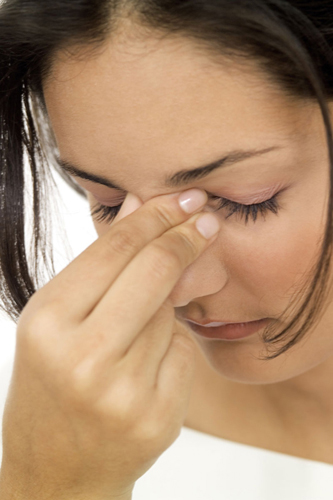| Q: |
How can other medical problems complicate migraine?
| | A: |
Migraine attacks may worsen or increase in frequency if you have
another illness. For example, in those with chronic neck and back
problems, migraine attacks can be triggered by the pain or by overuse of
analgesics and/or muscle relaxants taken for the pain. Apart from being
the result of neck pain, migraine may also cause neck pain through a
process called central sensitization, in which the nerves become
hypersensitive. Sensitization sets up a terrible cycle of neck pain causing migraine and, in turn, migraine causing neck pain.
|
| Q: |
What do I do if I have neck pain and migraine?
| | A: |
The first thing you need to do is get a correct diagnosis for the
neck pain by seeing an appropriate doctor. Once you know what is
causing the neck pain, you must avoid any medication for it that would
make the migraine worse. It is important to understand that the migraine
may be making the neck pain worse, and therefore the migraine must be
treated aggressively as well.
|
| Q: |
Can temporomandibular joint problems cause migraine?
| | A: |
No, a temporomandibular joint problem (pain in the head, jaw, and
face caused by impaired functioning of the joint where the lower jaw
meets the skull) does not cause migraine. Migraine is an inherited
problem. However, this problem or any other medical condition can make
migraine worse by acting as a trigger for the attacks. Avoiding any
medical condition that is a migraine trigger is critical for control of
migraine. All pain problems, especially in the neck, face, and head
area, must be treated aggressively.
|
| Q: |
Could what I think is a neck or temporomandibular joint problem actually be migraine?
| | A: |
Yes, you may be suffering from cutaneous allodynia, in which skin becomes hypersensitive to stimulation.
At the start of a migraine attack, the nerves to the blood vessels in
the brain lining are activated, causing the typical throbbing headache.
As the migraine attack progresses, the nerves in the brain stem, located
at the top of the spinal cord, become activated, producing more
discomfort as cutaneous allodynia develops. Neck or face pain may be
caused by cutaneous allodynia, which is part of the migraine attack, and
missing the diagnosis of migraine would result in the wrong treatment
for face or neck pain. Likewise, a misdiagnosis of migraine might miss a
neck or temporomandibular problem. An evaluation by an appropriate
specialist is required before you start treatment.
|
| Q: |
Can general medical problems cause migraine?
| | A: |
Many medical conditions can worsen migraine and trigger attacks.
If you suffer from frequent migraine attacks you must have a general
medical evaluation to make sure you don’t have other medical problems.
Some medical conditions, such as asthma and heart disease, are more
likely to trigger migraine attacks than others.
|
| Q: |
What disorders are commonly associated with migraine?
| | A: |
Disorders caused by a problem with the brain chemical serotonin
are more likely in someone with migraine. These serotonin-related
illnesses include anxiety disorder, depression, bipolar disorder,
attention deficit disorder, restless legs syndrome, irritable bowel
syndrome, gastroesophageal reflux, insomnia, and fibromyalgia. Other
conditions that can trigger migraine attacks include asthma, heart
disease, systemic lupus erythematosis, and endocrine problems such as
thyroid disease.
|
| Q: |
Can migraine be caused by eyestrain, dental pain, or sinus problems?
| | A: |
Migraine is not caused by eye strain, dental pain, or sinus
problems. However, the pain associated with these problems may trigger
more frequent migraine attacks. The nerves that go to and from the sinus
areas, mouth, and eyes are very complex. These nerves not only contain
pain sensory fibers but also nerve fibers that regulate the secretion of
fluids such as mucus. When the sensory fibers in a nerve are activated
and take information back to the brain, the other fibers in that nerve
can also be activated. This complicated process is sorted out in nerve
junctions called ganglia in the brain stem. When the sensory nerves send
information from eye strain, dental pain, or sinus problems, an overlap
of brain cell processing in the brain stem can trigger a migraine
attack.
|
| Q: |
How do I know if my symptoms are caused by migraine or another medical problem?
| | A: |
When you have symptoms it is important to go to the appropriate
professional to determine the cause of the problem. The place to start
is with your own doctor and/or dentist, who will refer you to a
specialist if necessary. Pain management for any problem is essential.
However, it is important not simply to treat the pain but to address the
underlying cause. Using analgesics for a prolonged period of time may
cause medication overuse headache if you have migraine, no matter why
you are taking the pain pill.
|
| Q: |
What if I have other chronic medical problems in addition to my migraine?
| | A: |
Trying to juggle multiple medical treatment regimens and
different doctors is not only confusing but can be expensive. To make
sure you get the best response to treatment you must have a doctor who
can coordinate your care and healthcare providers.
|
Myth or truth?
Myth
“Most headaches are caused by sinus problems or hormonal changes”
Truth
No, migraine is
the most common cause of frequent headaches. Most people would rather
treat their headaches as “sinus” headaches, and most women will insist
that their headaches are caused by hormonal changes. It is a common
belief that such headaches are more easily “fixed,” and that migraine
cannot be treated—which is a fallacy.

|